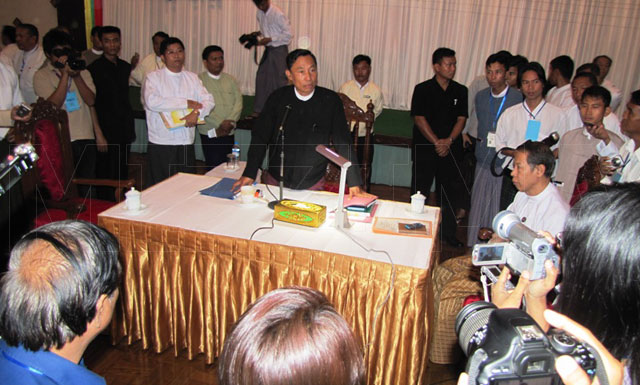Burma’s ruling Union Solidarity and Development Pary (USDP) is expected to transform itself and elect new leaders to decide its policies for 2015, as it opened its first party conference in Naypyitaw on Sunday.

Party Vice President Shwe Mann said the USDP would become “a people’s party.”
The 2015 election will be the first in which the National League for Democracy can compete nationwide, and it is expected to significantly increase its membership in Parliament.
President Thein Sein, who is the party's former chairman, was present briefly at the opening session of the conference to greet party members. The election of a new chairman will take place at the conference.
Observers said the ruling party is feeling pressure from both outside and inside to narrow the gap with the main opposition party led by Aung San Suu Kyi.
Members of the USDP were urged to work in the interests of the people.
“As we move toward the implementation of a democratic system for the benefit of the people, the USDP and all its members are required to participate enthusiastically wherever they are,” Shwe Mann told around 1,500 delegates in the capital.
One senior party member, who asked not to be named, told Agency France Press that the changes would give the party “new blood.”
“Reforming the party will be the significant thing of this first conference,” he said, adding that Shwe Mann was expected to be elected as acting chairman during the meeting.
Win Than, a USDP member of Parliament, told the BBC his party could not afford to stand still.
“We must not resist change now. If we don't change, we will lag behind. We have gone through several parliamentary sessions, and we now know what people want and what they don't,” he said.
The 16-million member USDP was transformed from a former military-backed social organization established in 1993 before the 2010 general election.
In the 2010, 37 political parties contested, with the USDP winning the majority of 883 parliamentary seats (76.5 per cent) out of a total of 1,154 at three levels: 259 seats in the Lower House, 129 seats the Upper House and 495 seats in region or state parliaments.
In addition, 25 per cent of parliamentary seats at each level are held by directly nominated and appointed military representatives.
The National League for Democracy, which contested in this year’s bi-election, did not register to compete in 2010.


